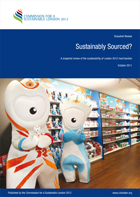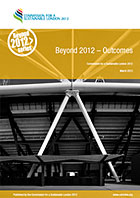
The Commission has published a snapshot review of the sustainability of London 2012 merchandise. The review, titled Sustainably Sourced?, examines the work done by LOCOG to implement sustainable merchandising policies, in line with the overall commitment to host the most sustainable Games ever held. With total expected retail sales in the region of £1 billion and 10,000 individual products, merchandise is a significant part of LOCOG’s revenue generation.
Shaun McCarthy, Chair of the Commission for a Sustainable London 2012, said:
“LOCOG has had success in making standard merchandise more sustainable, but not in making sustainable merchandise standard. London 2012 has been successful in changing the behaviour of the industry, but needs to seize the opportunity to change the behaviour of the consumer.
“We recognise that there are some sustainability issues which LOCOG can’t solve on its own; however, we believe that by fully engaging with LOCOG’s sustainable and ethical sourcing codes, London 2012 licensees can adopt more sustainable behaviour on a permanent basis. This will create a lasting legacy for UK and international brands and will have commercial as well as environmental and social benefits.
“We recognise that labour standards are an issue for the industry, and welcome LOCOG’s efforts to address this. However, more can be done by licensees, particularly in the area of public disclosure of factory locations”.
The key findings of the review are:
- LOCOG’s sustainable merchandising efforts are, to date, the best the Olympics and Paralympics have ever seen. LOCOG is setting new standards for the event and retail industries to follow. These standards include the Sustainable Sourcing Code and the Diversity and Inclusion Business Charter, which the Commission considers representative of best practice in the event industry. The application of these standards will be critical to the success of the programme.
- LOCOG’s merchandising standards have already made a difference. Some licensees are already changing the way they make and package their products. For example, the Stella McCartney for adidas Team GB range includes 5% organic cotton; Hornby is removing PVC from their packaging, and Touch of Ginger is remodelling its packaging to make it easier to recycle.
- The Commission recommends that LOCOG works with licensees to showcase improvements to sustainability. Traditionally, many of the industries involved in making merchandise have not sought to significantly address sustainability in their products and supply chain. Therefore we recommend that a series of case studies be developed using examples from London 2012 merchandise to help move these industries forward. These should demonstrate successes in areas such as ethical supply and environmental standards.
- In principle, the Commission believes that companies should publically disclose all supply chain locations. However, in practice this may be complex and unmanageable for LOCOG to achieve with its limited lifespan. This is why the Commission congratulates adidas, the only partner to fully disclose the location of all factories in its direct supply chain supplying London 2012 merchandise and official sportswear. The Commission also urges LOCOG to encourage more partners and licensees to follow adidas’ lead and disclose their factory locations.
- LOCOG must better communicate its sustainability standards to shoppers. While LOCOG’s efforts to make its merchandise more sustainable have been excellent, consumers may not realise this when they purchase products. For example, when a customer buys a product, it should be possible to tell them more about the sustainability story of that product.
- The Commission believes companies which adapt to meet LOCOG’s sustainability requirements will operate more efficiently and will have a competitive advantage. Many event contracts now require companies to meet sustainability standards: companies which meet LOCOG’s criteria will therefore have an advantage. Changes such as reducing packaging can also make a company more cost-efficient as well as more environmentally friendly.
- Their complaints and dispute resolution process for supply chain problems puts LOCOG amongst those at the forefront of action in this area. This sets an example for future Games, although the process must be actively publicised throughout the supply chain, right down to the workforce.
